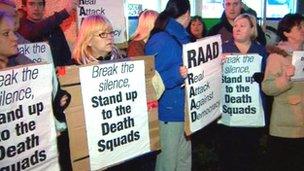RAAD republican group threatens more PSNI attacks
- Published
Spotlight on vigilante republican group RAAD
The group behind a bomb attack on a police vehicle in Northern Ireland this month has told BBC Newsnight it will carry out further such attacks.
Londonderry-based Republican Action Against Drugs (RAAD) told the programme that it had the same capability as the IRA before its ceasefire.
RAAD leaders gave Newsnight their first face-to-face interview as part of a report on their vigilante activities.
Since 2008 the armed group has murdered one man and shot more than 40 others.
They have persuaded some parents to hand over their children - some as young as 18 - to be shot by appointment in a non-lethal way to spare them more serious injuries, and dozens more young people have been ordered to leave the city.
The police admit they have failed to stop the group, which is made up of former members of the Provisional IRA, and are promising to redouble their efforts.
RAAD operates in the Derry nationalist areas of Creggan and Bogside, which during the Troubles were the centre of IRA activity in the old walled city.
The group was set up to tackle drug dealers in the area and its leaders are well known locally, but remain faceless to the outside world.
'Community support'
Two of the group's leaders agreed to meet Newsnight and answer questions on their activities on condition that they were not filmed.
In the interview, they claimed that they were taking up arms to protect their community from "parasites".
They said that they never shot anyone with a drug addiction, only those who sold drugs to "little children or vulnerable people".
"We don't operate in a vacuum. We have weapons to store, explosives to store, cars to store, so we are helped by the community," one said.
"Our ability to mount operations shows we have community support."
When challenged about whether members of the public only helped because they were fearful of what the armed group might do if they refused, they said this was not the case.
"We are fathers, husbands, we live, we go to work, we're just ordinary people. Ordinary people with a past and people say to us: 'There's a problem, help us, you used to be in the IRA,'" one said.
Ciaran McFadden describes how he "watched his son get shot"
Earlier this month, during a protest about policing, RAAD threw a bomb at a police vehicle. No-one was injured, but the group claims it is willing to carry out further attacks unless police searches of members' homes are suspended.
"We won't accept the community being brutalised. They're under pressure. They're taking their frustration out on the community."
They also claimed that they have more weapons in Derry than the IRA had prior to the ceasefire.
"We can do everything the IRA used to do, we have the capability," they said.
'Six-pack' shooting
Talking to parents whose sons have been shot in the legs, it is clear they are afraid of the gunmen.
Ciaran McFadden's 21-year-old son fell foul of RAAD when he got involved in a fight with one of its members.
Mr McFadden was told that the young man would be shot as punishment, but that since he himself had been in the IRA, RAAD were willing to do their old comrade a favour and only shoot him once.
Mr McFadden felt he had no choice and took his son to be shot. The bullet remains lodged in his calf because surgeons believe it would do more serious damage if it were moved.

A number of public protests against punishment attacks have been held in Londonderry
Other parents are making similar desperate calculations. Newsnight met one woman who had taken her son to be shot in both legs after RAAD accused him of drug dealing.
In her case she did so because she feared he might get a worse punishment, the dreaded "six-pack" - where someone is shot six times, in both elbows, both knees and both ankles.
When I asked Mr McFadden why he did not go straight to the police, he was furious:
"We don't live in a normal society," he said. "I could go to the police but where does that leave me? I'd have to leave this country."
The police are promising to redouble their efforts against RAAD and have renewed appeals for witnesses to come forward.
However, in the areas in which RAAD operates there is a traditional mistrust of the police.
And police say it is their background in the IRA that is making the group so difficult to stop. The PSNI's area commander, Chief Superintendent Steve Martin, told Newsnight:
"They are a small group which makes them difficult to target. They operate in a fairly tight geographical area. They comprise people who were involved in PIRA [Provisional IRA] activity and therefore have developed a certain level of ability in carrying out their crimes and evading detection."
- Published8 June 2012
- Published16 May 2012
- Published15 May 2012
- Published10 May 2012
- Published3 February 2012